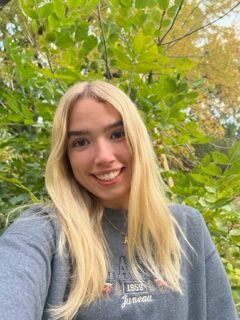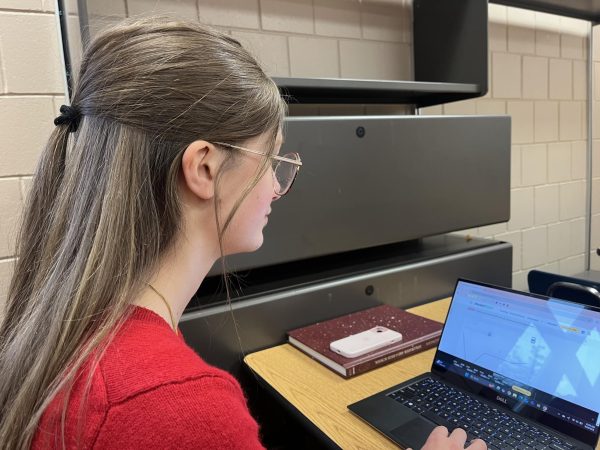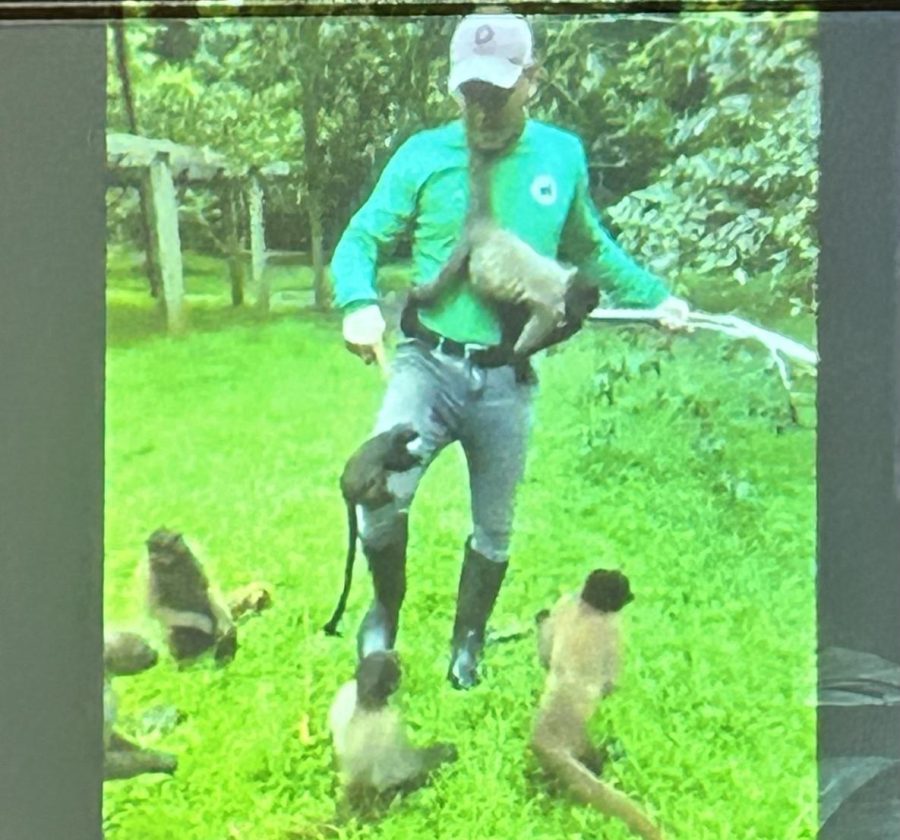Monkey Island inspires Spanish students
Photo submitted by Kirsten Carter
An employee on Monkey Island, Jair, plays with monkeys on a zoom call with one of Carter’s classes. The class covers the environment while incorporating the monkeys.
This April, Spanish classes worked with Monkey Island, a small island in Peru, to create a unique education opportunity. Through creating games, Zoom calls with the monkeys and numerous discussions, Spanish teacher Kirsten Carter was able to expose her students to something new and enrich their Spanish language skills.
Monkey Island is a rescue foundation located directly on the Amazon River in Peru. On the island, employees and volunteers rescue monkeys from bad situations or take them from people who do not want them anymore. Many monkeys that are rescued were purchased as pets when they were babies, but were abandoned as adults due to their high energy and activity levels. Another source to homeless baby monkeys is from poachers killing mothers for their tails to be used as dusters. By killing the mothers, they leave the babies abandoned and alone without sufficient life skills.
Monkey Island’s main goal “is to always rescue, rehabilitate and release” the monkeys, Carter explained.
Poaching has increased in the past few years, which has led to over 600 monkeys inhabiting the island. Most of the monkeys on the island live free in the rainforest and are fed from volunteers and employees placing large bowls of fresh cut fruits and vegetables out. Human interaction is left to a minimum to allow the monkeys to form independence in order to survive after being released. Around 45 monkeys need to live closer to the people on the island due to higher medical concerns or attachments. These monkeys are released farther away from the island otherwise they tend to return because of a learned dependency and formed relationships with the people. The island is working to slow the rate of extinction due to poaching and deforestation.
“They are doing so many good things for the animals and the preservation of these different species,” Carter said.
At the beginning of the year, Carter was given her Bethel University CIS plan which included what topics her classes needed to cover. One topic that caught her eye was the environment. While reading through the criteria, she came to the conclusion that it was very repetitive compared to many other environment lessons in other classes.
She wanted to avoid the constant cycle of similar information each year.
“Approaching it this year, I was trying to create some new ideas on how I could make it more engaging,” Carter said.
Carter explained how after visiting Monkey Island in 2019, she wanted to educate her students about the program’s message and story.
The environment unit was a perfect fit. The vocabulary and message correlated perfectly with the criteria she needed to meet. Carter worked with her friend and employee on the island, Jair, to set up a special Zoom call with each of her classes. These calls allowed her students to see the monkeys and ask questions while also increasing their language skills by conversing with a native Spanish speaker.
This year was the first time Carter’s students had been educated on Monkey Island, making the opportunity special and unique.
“There are not many native Spanish speakers that I’ve met at school, so being on a Zoom call with one was cool and nice to experience because it is new and different,” junior Mana Kavapalu said.
Carter’s goal to stray from the normal and create memories with her students was achieved. Students were also given the opportunity to create their own interactive games that were presented and played with their class. Each game was centered around monkeys and the environment.
Some games were beyond anyone’s expectations including Monkey Island Candy Land and Kavapaulu’s group’s game with “categories where they had to name the vocabulary word by acting it out.”
Students shared their love of being given creative freedom and were able to expand their vocabulary by learning new words which are applicable in everyday life. They grew and learned by interacting with each other while also discussing the environment and meeting the education requirements.
Speaking with a native speaker allows students to hear first hand how to pronounce words correctly and builds their confidence by using Spanish in a real life situation.
“Hearing their accents and how they pronounce certain words I’m not sure about or I feel like I’m mispronouncing, helped my understanding from their first hand knowledge,” junior Ava Mosley said.
Carter’s primary goal was to give her students an opportunity to speak to a fluent Spanish speaker naturally in an environment where help is still available.
Carters explained how “when students are able to have a successful exchange, the next time they will feel more confident about trying to speak to other people, which leads to more communication and practice,” in their future.
Increasing language acquisition while also learning about an organization across the hemisphere was a unique and special experience for Carter’s students that she hopes to carry into next year as well. She also plans on creating a unit plan and sharing it with other schools to increase awareness of the island and their message as well as give other students the special opportunity to increase their Spanish abilities.
Not only did Carter’s unit allow her students’ Spanish to grow, it also opened their eyes to the possibilities of helping others.
“It helps with world connectedness because even though you are in a little class in Minnesota, you can help animals across the world live a better life,” Kavapalu said.
The environment unit showed students their ability to make an impact which can lead to stronger leaders who strive to create a healthier and happier world. Trying to find a topic that engages the majority of students can be very difficult. Immediately after hearing about the Monkey Island unit, students showed a tremendous amount of interest.
Carter was filled with a feeling of accomplishment as she watched her students’ “faces during the Zoom and their reactions… so many people were just beaming,” with joy as the monkeys jumped in and out of screen.
Seeing her students so happy and excited over the curriculum she created for them, made all the planning and preparation worth every second Carter said.
Monkey Island inspires many people and helps hundreds of monkeys every day in their rehabilitation and release back into the wild, making sure they are healthy and safe.
“They are simply great people doing great things,” Carter said.

My name is Kennedy Williams. I am a junior and a Podcast Editor and Reporter. I play lacrosse, am in Student Council, and play piano. I love to hang out...





